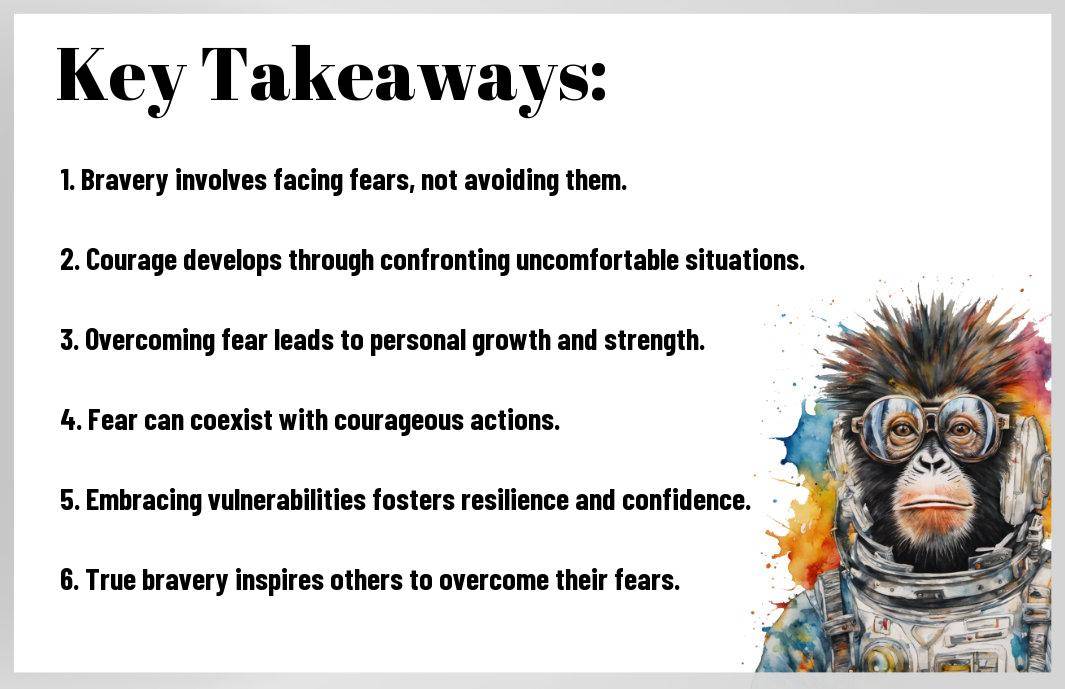
Newsletter Subscribe
Enter your email address below and subscribe to our newsletter

Enter your email address below and subscribe to our newsletter

You may often associate bravery with the absence of fear, but the reality is far different. True courage is not about living without fear; it’s about how you confront and overcome it. I’ve come to realize that embracing my fears can lead to personal growth and greater resilience. In this post, I will explore the different dimensions of courage, demonstrating how you can transform fear into a powerful motivator to achieve your goals. Together, we will uncover what it truly means to be brave in the face of adversity.


While courage is often romanticized as a heroic trait, in my view, it is fundamentally about the ability to confront and navigate through fear. Understanding courage requires acknowledging that it exists alongside vulnerability. It is this intricate balance that empowers us to tackle challenges head-on, despite the internal battles we may face.
Above all, bravery is the act of taking action despite feelings of fear. It’s the moment when you choose to step out of your comfort zone to face a daunting situation. Unlike courage, which involves a deeper emotional engagement, bravery is often seen as a spontaneous response that can lead to moments of triumph.
On the journey toward understanding courage, the nature of fear becomes a central aspect to explore. Fear is a universal emotion that acts as a survival mechanism, alerting us to potential threats. However, it can also feel overwhelming and paralyzing. To cultivate courage, I must learn to acknowledge and confront this fear, rather than let it dictate my responses.
Nature of fear is complex. It serves both protective and limiting roles in our lives. Your fear can trigger an adrenaline rush, preparing you for a fight or flight response, which can be beneficial in dire situations. Yet, when left unchecked, it can lead to avoidance behaviors that hinder your personal growth. In recognizing fear as a normal part of the human experience, I can apply strategies to transform it into a motivating force rather than allowing it to paralyze me.

Any journey towards overcoming fear begins with an understanding of its psychological underpinnings. Fear is not merely an emotional response; it’s a complex interplay of biology and experience that influences our thoughts and actions. Recognizing the way fear manifests in your mind and body can help you confront it effectively. By dissecting your fears, you can begin to dismantle their power over you and reshape your approach towards them.
Around us, fear responses can be observed in varying degrees. When you encounter fear, your body initiates a fight-or-flight response, heightening your senses and preparing you for action. This natural reaction can lead to stress and anxiety if left unchecked. Understanding these physiological and psychological responses is the first step in managing your fear effectively.
At the core of overcoming fear lies the utilization of specific strategies. Creating a plan can help you regain control when faced with what frightens you. By setting small, achievable goals and gradually exposing yourself to your fears, you build resilience. Techniques such as mindfulness meditation and deep-breathing exercises can also be beneficial in grounding you and reducing anxiety when fear strikes.
Plus, I encourage you to utilize visualization techniques. Picture yourself successfully facing your fears; this mental rehearsal prepares your mind for action. Additionally, surrounding yourself with supportive individuals can foster a stronger sense of security. Each small step you take reinforces your confidence, making obstacles seem less daunting. Lastly, acknowledge your progress, however small, to cultivate a positive relationship with fear, transforming it from a barrier into a motivating force in your life.
Not every step towards personal growth is easy, but it is the moments of courage that truly define our journey. Embracing fear and acting despite it fosters the growth we seek. When we push through our limits, we discover the potential that lies within us, leading to greater self-awareness and fulfillment.
By confronting challenges head-on, I have learned that courage acts as a catalyst for transformation. Each obstacle I face sharpens my resolve and provides valuable lessons, allowing me to evolve and become more adept at handling future difficulties.
Below the surface of fear lies the opportunity for resilience to grow. Each time I confront a fear, I am not just overcoming it; I am also strengthening my ability to bounce back from adversity and cultivate a mindset that embraces life’s uncertainties.
Understanding resilience is key to navigating life’s ups and downs. It involves acknowledging your fears and taking deliberate actions to rise above them. As I face challenges, I build a mental toolbox of strategies and perspectives that empower me to handle setbacks. This not only enhances my inner strength but also develops a profound sense of self-efficacy. The more you practice this resilience, the more equipped you will be to face any obstacle that comes your way.
Unlike popular belief, courage is often displayed in the face of real danger and adversity throughout history. Many figures have taken significant risks to stand up for their beliefs, inspire change, and forge paths for future generations. Their actions remind us that bravery manifests in various forms, from military leadership to civil rights advocacy. By examining these historical examples, I can begin to grasp the true essence of courage and how it shapes our world.
Above all, historical figures such as Nelson Mandela, Rosa Parks, and Mahatma Gandhi exemplify courage through their unwavering commitment to justice and equality. Each of these leaders faced immense challenges and risks, yet they remained resilient in their pursuit of a better society. Their stories inspire me and others to stand strong in our beliefs.
Against the backdrop of extraordinary historical figures, everyday heroes exemplify courage in more subtle but equally impactful ways. I find solace in knowing that you don’t need a grand platform or a historical context to be considered brave. Each day, ordinary people display courage in the face of adversity, whether through acts of kindness, standing up against injustice, or showing resilience in personal hardships.
Courage shapes our communities as individuals step up during challenging times, displaying selflessness, determination, and compassion in the face of danger. Think of the healthcare workers who risk their lives to care for the sick, or the neighbors who support each other during natural disasters. These unsung heroes often act without thought of recognition, showcasing individual bravery in their everyday lives. I’d like to emphasize that your actions, no matter how small, can have a profound impact and exemplify real courage in society.
Now, I believe that courage significantly transforms society. It inspires individuals to stand up against injustice, challenge the status quo, and advocate for change. When people demonstrate bravery in their actions, it creates a ripple effect that encourages others to confront their fears and pursue positive outcomes. Ultimately, this fosters a culture of resilience and determination, leading to a more vibrant, empowered society.
Behind every great movement lies acts of courage that challenge systemic issues and promote social justice. When individuals bravely confront societal norms, they pave the way for important changes, urging others to join the cause and elevate collective voices. Your courage can serve as a catalyst, igniting passion and action in those who witness it.
On the journey of courage, I find that one person’s bravery can light a fire in the hearts of many. When you take bold steps to confront your fears, it encourages others to do the same. Your story can serve as an empowering example, letting others see that overcoming obstacles is achievable and worthwhile.
Consequently, by sharing our personal tales of bravery, we can profoundly impact the lives of others. Your courage can become a beacon of hope, motivating those who may be struggling to overcome their own challenges. Through this ripple effect, the strength of one has the potential to foster a community where everyone feels empowered to act. When we openly acknowledge our fears and triumphs, we inspire a culture of bravery, uniting individuals in their pursuit of positive change.
After realizing that courage is not about being fearless, I launched on a journey to develop my own courage. It became clear that embracing vulnerability and facing fears head-on were important components of this growth. By consciously putting myself in challenging situations, I learned to wield my fear as a tool for personal development. Each small victory built my confidence and showed me that courage is a skill that can be cultivated over time.
Above all, taking practical steps is vital in developing your courage. Start with small challenges that push your boundaries, whether it’s speaking up in a meeting or trying something new. Gradually, as you face these fears, you will build resilience and a greater sense of self-efficacy.
The journey toward courage also requires significant mindset shifts. Rather than viewing fear as a barrier, I learned to see it as a guide, indicating areas of growth. When you reframe your perspective, fear transforms from a hindrance into an opportunity for resilience and strength.
In addition to changing how I perceived fear, I focused on embracing growth over perfection. I understood that it’s okay to stumble along the way; what truly mattered was my willingness to get back up. By shifting from a fixed to a growth-oriented mindset, I cultivated greater self-compassion and became more open to challenges, ultimately fostering a life marked by courage and fulfillment.
So, as I reflect on the essence of courage, it becomes clear that bravery isn’t about being fearless; it’s about confronting our fears head-on. You have the capacity to overcome challenges despite the emotional weight they carry. When I consider moments where I’ve felt fear yet pushed through, I realize this notion of bravery resonates deeply. If you want to explore this idea further, you might find it intriguing to check out [Do you agree that bravery is not absence of fear but it is …](https://www.quora.com/Do-you-agree-that-bravery-is-not-absence-of-fear-but-it-is-courage-when-you-are-afraid) for more insights.
A: The statement implies that experiencing fear is a natural human emotion. Bravery is not about being devoid of fear, but rather about facing it head-on and taking action despite feeling afraid. It’s about acknowledging fear and still moving forward, demonstrating strength and resilience.
A: Developing courage takes practice and patience. One can start by identifying specific fears and gradually confronting them in manageable steps. Engaging in positive self-talk, seeking support from others, and celebrating small achievements can also help build confidence over time.
A: Yes, courage is particularly important in situations that involve personal risk, ethical dilemmas, or making significant life changes. For instance, standing up against injustice, speaking out about personal experiences, or leaving a toxic relationship requires a strong sense of bravery.
A: Absolutely! Courage can manifest in various everyday scenarios, such as having difficult conversations, trying new experiences, or making choices that align with one’s values. Everyday acts of bravery contribute to one’s overall confidence and personal growth.
A: Overcoming fear often leads to a broader understanding of oneself and one’s capabilities. Each time a person faces a fear, they expand their comfort zone, gaining insight and skills that can empower them to tackle future challenges. This process fosters resilience and a sense of accomplishment.
A: Yes, it is entirely possible to feel fear and still behave in a brave manner. Courage does not imply the absence of fear; rather, it emphasizes taking action despite it. This duality highlights that bravery can coexist with trepidation, showcasing the strength of human spirit.
A: Yes, acts of bravery can be incredibly inspiring to others. When individuals witness someone confronting their fears, it can motivate them to do the same. Bravery often creates a ripple effect, encouraging others to embrace their own challenges, fostering a supportive and courageous environment.